- Home
- Cynthia Kadohata
Weedflower Page 2
Weedflower Read online
Page 2
“Yes, because I’m her friend too.”
He followed her to the bathhouse to put the platform in the bottom of the tub, and then he followed her back to the shed.
Sumiko separated some of the bunches by color but mixed the colors in other bunches. Sometimes she took too long to bunch flowers because she liked them to look just so. Personally, she didn’t favor the reds, pinks, and whites of carnations. She liked the stock better—they came in just about every color. Lately, peach was her favorite stock color. In fact, she’d made Uncle plant a little section of just peach so that she could use the flowers for the dinner table.
She kept the shed door open so she could keep track of who was walking in and out of the bathhouse. The men bathed in order of age—Jiichan first, then Uncle, then Ichiro, then Bull, and then Tak-Tak. After that came Auntie and, finally, Sumiko. Every night while Tak-Tak took his bath, Sumiko went inside the house to start the rice. She always divided daytime and nighttime by when Tak-Tak finished his bath. After he finished bathing, it was considered nighttime, and just a few mealtime chores remained before Sumiko allowed herself to stop working.
Tonight she couldn’t wait until dinner was over so she could take the time to study her two best dresses and decide what to wear to the party. Auntie had made her a new dress a few months ago for a wedding. The dress actually rustled when she walked! She also owned a mint green school dress that she liked. It was a hard decision.
2
WHEN AUNTIE FINISHED BATHING, SUMIKO WENT OUT for her turn. To keep the water clean for as many days as possible, they all washed themselves off with sponges, soap, and a bucket of water before they got into the tub. By the time Sumiko bathed, both the water and the air had cooled off. Sumiko could not remember ever taking a hot bath in a nice steamy room.
She got undressed and sponged off. She always checked the scars on her tummy, from the car accident her parents had been killed in so many years earlier. She didn’t remember much about it except spinning around.
She climbed into the tub and swooshed her whole head and body under the water. The water pressed softly against her face. She had a thought and sat up quickly. Should she bring some flowers to the party? Someday when she achieved her goal of owning a flower shop, she would be an expert in arranging flowers. She loved to create arrangements for the dining-room table. Sometimes she liked an orderly arrangement, and sometimes she liked something wilder. Now she decided to bring a bunch of peach stock to the party. Everyone would love the scent and the wildness of the flowers.
She held her breath and dunked underneath the water again. When she lifted her head, she could feel a breeze from a crack in the wall. She stepped into the chilly air, dried off quickly, and went inside without draining the tub. It was her job to decide when to empty the tub and put in fresh water. Auntie didn’t like to waste water, so sometimes Sumiko kept the same water all week. On the farm they all had their farm duties, and in general they didn’t like to tell one another how to do their jobs. Once in a while someone would say casually within her hearing, “The bathwater is getting a little stale.” Or, “I wonder when Sumiko will change the bathwater.” Today the water was definitely getting a little musty, but not quite musty enough to change.
That night Sumiko couldn’t focus on any of the chatter during dinner. The grown-ups seemed obsessed with someone named Mrs. Sumiko Hata, whose brother and husband had suffered heart attacks within days of each other, which resulted in Mrs. Hata’s son taking over their Oregon potato farm, which started a chain reaction that ended in the previously wealthy Hata family nearly going broke and thereby providing gossip for Nikkei all up and down the coast. Nikkei were anyone in America of Japanese descent, whether they were born in the United States or Japan. Sumiko had never met Mrs. Hata, and neither had her family.
Jiichan liked to say that Sumiko’s head was divided in half: the half that liked to work and the half that liked to daydream. As everyone ate and chatted she started daydreaming about what kind of cake Marsha Melrose would serve at her party. Sumiko’s most favorite cake ever was the strawberry cake that Mrs. Muramoto had served one year at the Muramotos’ annual New Year’s Day party. If Marsha’s mother served strawberry cake, she wasn’t sure whether it would be considered rude to ask for a second slice. Her mind snapped back to the table when she heard Ichiro say, “A friend of mine thinks that the U.S. government may execute all the Nikkei if war with Japan breaks out.”
Sumiko had heard that rumor before, but Uncle had admonished her not to believe it. He said “only crazy people” believed that. Still, she couldn’t stop herself from asking, “Which friend?” Some of Ichiro’s friends had been to college, so they were really smart.
Ichiro started to answer, but Auntie cut him off. “No war talk at the dinner table.”
It was all really complicated, and things changed constantly. But as far as Sumiko understood, Nazi Germany had taken over France, Yugoslavia, Greece, Austria, and some other countries, and Germany had bombed England and then attacked the Soviet Union, or else attacked the Soviet Union and then bombed England … or maybe did them both at once. And Ichiro said the United States had imposed an oil embargo on Japan, who had signed a pact with Germany and Italy. And this was all just off the top of Sumiko’s head—there was a lot more going on. The world was a huge mess. But the United States was officially neutral, and Ichiro had read somewhere that more than 90 percent of Americans opposed getting involved in the war. So Sumiko assumed there would be no war and she could continue to work on her flowers until things settled down.
Every day she looked at the peaceful flower fields, and sat in school learning social studies and math and music, and slept in her warm bed, and she just couldn’t believe that the United States would ever get involved in a war.
Ichiro looked at his watch. He went out a lot, but Auntie always insisted he stay until dinner was finished.
Ichiro was a dandy. He’d already gotten ready to go out, which meant he’d smeared grease through his hair. Sumiko could smell it from where she was sitting across the table. And he was actually wearing gold suspenders a girlfriend had made him. Tee-hee! He liked girls and gambling, and he spent a lot of his money on clothes. Sumiko couldn’t imagine why girls would like gold suspenders and greasy hair; still, she had to admit it suited Ichiro. But he was just as handsome in overalls.
Bull’s hair was a big mess, like it always was after his bath. Before his bath his hair was usually a small mess. He did try to comb it in the mornings, but the combing didn’t “take” because his hair was bristly as a horse brush.
Sumiko often marveled over how different Ichiro and Bull were. Bull didn’t even pick out his own clothes—Auntie made him overalls and shirts. He rarely went out for fun except when he played baseball with other Nikkei. He did have a girlfriend a couple of years ago, but Sumiko didn’t know what had become of that. Ichiro, on the other hand, went out with girls all the time. But the point was, Ichiro knew a lot of people and heard all the important rumors.
One “rumor” that was not a rumor: Last August a U.S. congressman had suggested that ten thousand Japanese Americans ought to be incarcerated and held as hostages to make sure Japan would not act in a hostile manner toward the United States. Sumiko remembered when they’d all heard that on the radio. Auntie had exclaimed, “Law-abiding citizens held hostage!” The grown-ups had discussed that for weeks. Sumiko did not believe it was possible. White people treated her fairly enough. In fact, there was a lady at the grocery store who gave her a free apple once.
Sumiko swallowed some rice. “A white lady gave me an apple once,” she said.
Everybody just looked at her uncomprehendingly.
“Mother, I need to get going,” Ichiro said.
Auntie said, “We’re almost finished.”
They frowned at each other.
Jiichan took out his teeth and looked at them and put them back in. Sumiko moved her eyes to Auntie to see her reaction. Auntie laid the palm of her right ha
nd softly against her heart, as if she were having a mild attack.
Jiichan didn’t notice. He went back to attacking his food, slurping a piece of meat into his mouth as if it were a noodle. Jiichan’s lean face fascinated Sumiko. If she hadn’t known him, she would think he was angry all the time. His cheekbones jutted out, and he scowled even when he was joking. He’d come to America because he was a second son. Among the Japanese, a father left everything he owned to his first son. So Jiichan had always struggled for money, and some people thought he was bitter. But Sumiko was glad he was a second son, because otherwise, he never would have come to America and she and Tak-Tak would have been born in Japan.
Now he took out his teeth again and studied them as if they were a crystal ball. “Someday Bull be as strong as I once was,” he predicted. He put his teeth back in.
Sumiko and Tak-Tak giggled. Food splattered out of Tak-Tak’s mouth as he tried to hold back full laughter.
Auntie looked at Uncle, which meant that Uncle was supposed to say something. Uncle finally came up with, “Children, no giggling at the table.”
Auntie frowned at Tak-Tak, and Jiichan frowned at Auntie.
Uncle and Auntie were in their late forties, and their faces were lined and dark from working in the fields all their lives. But Uncle smiled more than Auntie. Auntie did not have a sense of humor, or at least that’s what Jiichan said when they were cross with each other one day.
All during dinner Sumiko’s legs swung and shook with impatience. She wanted to finish so she could study her dresses. Toward the end of dinner even Auntie seemed impatient. The whole family watched Jiichan chew slowly. Dinner was never over until he stopped chewing. Every time he seemed about to stop, he would frown thoughtfully at the table and refill his plate. Finally he frowned thoughtfully at the table … and didn’t fill his plate! He pushed his chair back and looked warningly at everyone. “Need digestive peace now.” He ambled away, no doubt to sit in his chair and digest.
After Sumiko washed the dishes, she rushed to her bedroom so she could study her dresses. Her crisp blue dress had been worn only once. But her mint green school dress was her favorite dress ever. And once when she was wearing it, the boy who worked at the grocery store had said it was pretty. She pulled the blanket divider closed so she could think about the dresses in private. If she’d had a mirror, she would have tried them on.
But when she heard Tak-Tak climb into his bed, she went around to tuck him in. He lay in bed with his glasses on and his cage of pet crickets on his pillow.
“Can I take off your glasses?” she said.
“But what if I get up in the middle of the night and can’t see anything?” That was a big fear of his lately.
“I’ll be right here.”
“Okay,” he said reluctantly.
He sat up, and she took off his glasses. Whenever she took them off, a ridge from the band jutted out from his hair.
“I’m putting them right here on the nightstand,” she said.
“Uh-huh.” He pulled his blanket over his head without saying good night.
“Do you want me to put the crickets on the table?”
“Okay.”
She set the cage on the table. “They’re right here,” she said. He didn’t answer.
Sumiko turned off his light. Then, after she got in bed, he called out to her, “Do you think they’ll kill us if war breaks out?” His voice was muffled, so she knew he still lay under his blanket.
“Uncle will protect us.”
“Are you sure?”
“Yes.”
And she was sure. She’d heard similar rumors for almost as long as she could remember. She trusted Uncle a lot. He wouldn’t let anything happen to them.
Sumiko looked out the window. In the fields the tattered pieces of cheesecloth rippled like ghosts. Far away she could see the flower fields of their neighbors Mr. and Mrs. Ono. Mr. Ono believed in the future, and he liked to say that inventions were the foundation of the future. His own newest invention: lights he’d hung over his fields to try to force some chrysanthemums to bloom early. Other farmers used lights too, but he said his lights were special. He also had developed a special strain of chrysanthemums that was much in demand at the market.
The lights twinkled like low-hanging stars above his fields. A few years ago he had tried to keep his fields warm in the winter by burning tires. The smell reached all the way to Sumiko’s house. Her family had needed to keep their windows closed the whole winter. Now Sumiko opened the windows to let the cool December air waft into the room.
Tak-Tak’s pet crickets chirped loudly, a sound Sumiko loved since crickets were good luck. The chirping seemed farther away than usual. Sumiko’s mind was already drifting to thoughts of Saturday’s party. The party was the only thing that seemed real. Marsha Melrose wasn’t the most popular girl in class, but she was definitely popular. Sumiko could already imagine Marsha’s house and how beautiful it would be. Marsha’s father was a city councilman, and her mother was a real, true exballerina. Originally, the Melrose fortune had come from a magic elixir that Marsha’s great-grandfather had invented during the pioneer days. Jiichan said it was not elixir, but “a bunch of crock.” Only he pronounced it more like “clock.” Sumiko lay back and pulled her blanket around her.
The crickets chirped and chirped.
3
BEFORE BREAKFAST THE NEXT MORNING SUMIKO PUT on two sweaters over her work clothes and went out to disbud the carnations. The carnations and stock emitted a similar scent. In the mornings the air was thick with it. Sumiko blew on her hands to warm them. Everyone else was already working.
Disbudding was women’s work—on a couple of occasions when Sumiko was sick, her uncle had hired local girls to disbud. Later she’d felt a little jealous when he’d said they did a good job. But then he’d told her that she worked faster than the other girls. Disbudding required quick judgment, because you needed to decide which bud was the strongest on a plant. You pinched or clipped off the weakest buds in favor of the one strong bud, so as to end up with one beautiful, strong flower. Sumiko used a special knife that she’d gotten for Christmas last year. Every year at least one person in Sumiko’s class asked her, “Are you Buddhist? Do you celebrate Christmas?” Sumiko was Buddhist, but actually, every Buddhist she knew celebrated Christmas by getting a tree and giving gifts.
Uncle had painted the handle of her knife yellow and then had painted SUMIKO’S PROPERTY on one side of the handle and DO NOT TOUCH on the other. She always cleaned and sharpened her knife after she disbudded.
She moved quickly down the row of flowers. Every so often she spotted a flower and just knew it would be the best flower. Other times she needed to make a quick decision about which would be the best. She liked how she needed to work and think at the same time to be a really good disbudder.
Auntie called out, “You’ll miss the school bus!”
Sumiko jumped up without finishing the row, because Auntie got irate when Sumiko missed the bus and had to be driven to school by a neighbor.
She just managed to change clothes, grab her books, and run like mad to the road before the bus braked to a stop at her house. Sumiko preferred to sit at the front of the school bus. Sometimes some of the boys taunted her for being Japanese, but if she sat in front, they didn’t bother her unless they were in a mean mood. Today she sat right near the driver. Her stomach gurgled in hunger because she hadn’t had time to eat breakfast. She looked out the window. A few of the flower growers also grew vegetables. Before her parents had died, they had leased a celery farm twenty miles away but she couldn’t remember any of that no matter how hard she tried.
“Sumiko!”
Sumiko jumped to her feet. “Yes; Mr. Johnson.”
“I said, name a major export of the West Indies.”
West Indies! Sumiko had thought the class was discussing India, not the Indies. She’d been thinking about the party again and about how she hoped she would remember enough details about it to satisf
y her family. She glanced down at her book. She wasn’t even on the page about India, but about Venezuela. She blurted out, “Tractors!”
Mr. Johnson looked pained. He rubbed both sides of his forehead with his palms. It wasn’t personal; he did things like that whenever anyone got a wrong answer. Tractors—what had she been thinking? She felt her face grow hot.
Sometimes Mr. Johnson took out his handkerchief and wiped his eyes as if he were crying. Now he shook his head sadly and walked to the blackboard and wrote Sumiko—P. They were playing P-I-G. Mr. Johnson asked everybody geography questions, and then every time a student got a wrong answer, the student got a letter. The first one to get “P-I-G” was the loser. Everyone got to call the loser “pig” all day.
Sumiko sat down.
“Susan, name a major export of the West Indies.”
Susan jumped up. “Bananas, Mr. Johnson.” Susan smiled and sat down. Susan was one of Marsha’s best friends. Neither of them had ever been “P-I-G.” Neither had Sumiko, but she’d gotten “P-I” twice. During class she often found herself worrying about the farm. Once after a strong wind some of the cheesecloth had fallen down and crushed the carnations. Another time Tak-Tak got stung by a wasp, and first his arm and then his head swelled up. Sumiko wasn’t there, but Uncle had described it in detail because he knew Sumiko would want to know exactly what had happened. She liked to know every important thing that happened to Tak-Tak and every important thing that happened on the farm.
Now, she was thinking about how Uncle had told her he would buy a present for Marsha on the way home from the flower market.
“Sumiko!” shouted Mr. Johnson. She jumped to her feet again. She knew it was her lucky day because Mr. Johnson said, “Name a major export of Venezuela!”
She glanced down at her book and then said, “Oil.” She sat down happily.
The school bus passed a bunch of Nikkei kids on bicycles. They were probably headed for Japanese school. Sumiko didn’t attend Japanese school after regular school because her family needed her too much on the farm. They’d tried sending her to Japanese school for a while, but she’d ended up falling behind in her regular school. Sometimes she thought she might have more friends if she attended Japanese school.

 Weedflower
Weedflower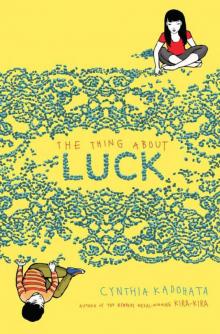 The Thing About Luck
The Thing About Luck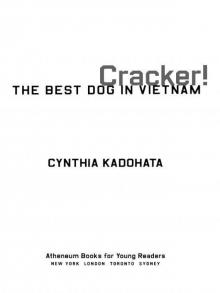 Cracker!: The Best Dog in Vietnam
Cracker!: The Best Dog in Vietnam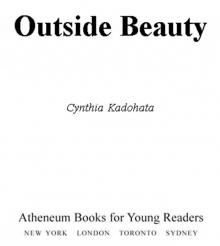 Outside Beauty
Outside Beauty The Glass Mountains
The Glass Mountains Kira-Kira
Kira-Kira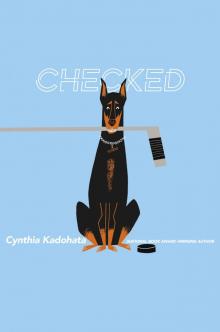 Checked
Checked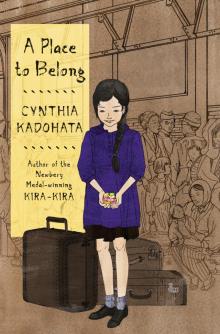 A Place to Belong
A Place to Belong A Million Shades of Gray
A Million Shades of Gray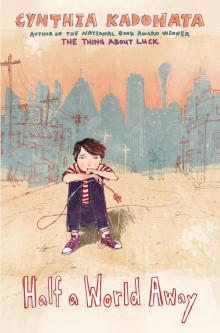 Half a World Away
Half a World Away